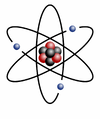@ Pinball (above)
Now, first of all, I'm not trying to force a choice of words on anyone; you're perfectly entitled to describe these things any way you like. I would say this though:
1. It seems perfectly appropriate to me to describe Newtonian physics as having been overthrown, and obviously many top notch physicists feel the same way.
2. I suspect the reason -- or one of them -- why you're reluctant to apply the word "overthrown" is, with all due respect, that you don't quite appreciate the difference between the ontology of a theory (i.e. what the theory says the universe is like), and the predictions which can be derived from that theory. The physicists I quoted do appreciate the significance, thus have no hesitation in using the word "overthrown".
Newton makes certain theoretical (i.e. unobservable) assertions about how our universe is. These theoretical assertions just are the theory (the predictions derived therefrom are not the theory). These core assertions include (i) space and time are uniform, independent and absolute, and (ii) there is an attractive force, which he calls gravity, which acts instantaneously over any distance according to a certain mathematical formula.
This, then, is Newton's ontology (= his theory). This, according to him, is the architecture and furniture of our universe.
Since Einstein, by and large (there may still be a few Newtonians out there), it is no longer believed that Newton's ontology (= his theory) describes how our universe really is. It is now believed that our universe is nothing like that. Physicists, by and large, now believe space and time are neither absolute, independent, nor uniform. They do not believe there is an attractive gravitational force at all. In other words, the architecture and furniture of our universe is nothing like Newton described.
Do you agree with this so far? (I can't emphasize enough, forget about the predictions which can be derived from the theory because they are not the theory). Any objections? If not . . .
Do you feel it is appropriate to say -- at least if we take Einstein seriously -- that Newton's ontology is all wrong, indeed that his core theoretical postulates do not even exist?
If so, do you feel it is appropriate to say that Newton's theory (= his ontology) has been overthrown? If not, why not? If you mention predictions again, I'll shoot you lol. The predictions are not the theory!
If you're still not persuaded (and that's ok), how about you give us an example of a scientific theory that, in your view, was overthrown, and explain why you think it is appropriate to speak of it being overthrown in this case?
Are there any?

